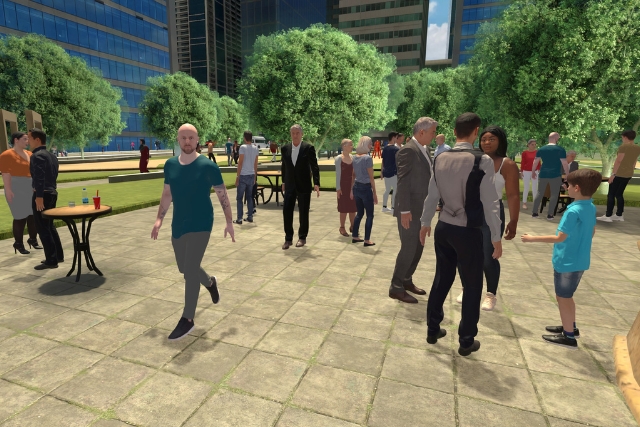FORMATION AUX COMPÉTENCES SOCIALES AVEC LES CHERCHEURS DE L'UNIVERSITÉ AIX-MARSEILLE
Doctorante en psychologie au sein du Laboratoire de Psychologie Sociale de l’Université d’Aix-Marseille, je travaille avec le Dr Del-Monte, Mme Fauvarque, et le Pr Graziani sur la réalité virtuelle dans le cadre thérapeutique.
Dans ce cadre, j’ai le plaisir de travailler depuis 3 ans avec les logiciels C2Care. La pluralité et la personnalisation des environnements m’ont permis d’avoir la liberté d’orienter mes recherches dans la direction souhaitée sans barrières technologiques. La réalité virtuelle n’a plus à prouver son efficacité dans le domaine thérapeutique. Que ça soit dans le traitement des phobies en tout genre, la réhabilitation cognitive ou même la relaxation, cet outil en constante évolution, est un véritable atout pour les professionnels et les chercheurs. De plus, la thérapie n’est pas toujours très engageante mais le caractère ludique et nouveau de la réalité virtuelle est un argument non négligeable qui attire et motive les patients comme les participants, pour le domaine de la recherche.
Généralement présentés comme de formidables supports pour la thérapie d’exposition, nous avons souhaité détourner les environnements de leur objectif premier en se concentrant sur un pan de la psychothérapie moins exploité : la formation aux compétences sociales. Et pourtant … dans de nombreuses pathologies psychiatriques, de l’anxiété sociale aux troubles de la personnalité en passant par la schizophrénie ou l’autisme, l’acquisition des compétences sociales fait souvent défaut. Ces troubles dans les relations interpersonnelles génèrent des difficultés dans les sphères de la vie privée, sociale et professionnelle qui se surajoutent aux autres symptômes auxquels le patient doit faire face. L’intervention sur ces sphères passe la plupart du temps par des jeux de rôle dans le contexte de groupes thérapeutiques ou de situations simulées dans le bureau du thérapeute.
Bien que ces modalités restent intéressantes, elles ont pour défaut d’être trop éloignées des situations que vivent les patients dans leur vie quotidienne. Malheureusement, il est souvent compliqué voire impossible, de mobiliser des individus extérieurs acceptant de jouer le rôle d’interlocuteurs sociaux dans le cadre de jeux de rôle.
C’est ici que la réalité virtuelle peut être exploitée dans toutes ses capacités. La pluralité des environnements, mais aussi leur contrôlabilité, et leur personnalisation sont autant d’éléments qui en font une base pertinente pour ces jeux de rôle. Le logiciel offre une variété de situations tout à fait pertinente : des situations scolaires, ou encore des situations nécessitant de parler face à un public varié. Cette personnalisation permet de graduer la difficulté (comme par exemple l’attitude des interlocuteurs, le nombre de personnes présentes dans un public) ce qui est extrêmement intéressant pour la recherche et pour la pratique thérapeutique. Nous avons pu proposer exactement la même situation à tous nos participants et nous assurer de la validité de nos résultats. Avec une situation réelle, les variables incontrôlables auraient été trop nombreuses pour nous permettre de valider nos hypothèses sans crainte qu’elles soient plus responsables des résultats que les variables que nous avons choisi de mettre en place.
Sur la base des environnements prévu pour l’exposition des patients touchés par la glossophobie et la phobie scolaire, nous avons travaillé à comment stimuler les comportements sociaux dans ces environnements. En d’autres termes, nous avons travaillé à augmenter les comportements sociaux vis-à-vis des personnages virtuels (comme le public) présents dans l’environnement virtuel.
Sans trop en dévoiler pour le moment, les résultats sont encourageant et nous offre des perspectives intéressantes. Pouvoir stimuler ces comportements en réalité virtuelle permettrait aux patients de se sentir plus confiant pour mettre en place ces comportements dans leur vie quotidienne ce qui améliorera leur sphère sociale et donc le soutien social, et de fait, leur qualité de vie.
Article écrit par Lisa Cerdà – Doctorante en Psychologie – Laboratoire de Psychologie Sociale de l’Université d’Aix-Marseille


